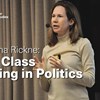lass

Lars Ingelstam on the beginnings of the Institute for Futures Studies in Sweden
In 2013 the Institute for Futures Studies in Stockholm celebrated 40 years. Lars Ingelstam, the first CEO of the organisation reminisces how it all began and talks about the first years of activities
Mass Reproducibility and Replicability: A New Hope
I4R Discussion Paper 107 Abstract This study pushes our understanding of research reliability by reproducing and replicating claims from 110 papers in leading economic and political science journals. Th
Hanna Wass: Too much of a good thing? The future of the antifragile democracy
Hanna Wass is an Academy Research Fellow and University Lecturer in the Department of Political and Economic Studies at the University of Helsinki. ABSTRACT As a potentially antifragile system, the stre
Making their Mark. Disentangling the Effects of Neighbourhood and School Environment on Educational Achievement
Working Paper 2007 No. 3 A revised version is published in the European Sociological Review, 24 (4). Lars Brännström

Johanna Rickne: The Class Ceiling in Politics
Research seminar with Johanna Rickne, professor of Economics at SOFI, Stockholm University Abstract: Prior studies have documented that working-class individuals rarely become parliamentarians. We kno
Edward Page: Addressing future loss and damage associated with climate change
Edward Page, Associate Professor of Political Theory, University of Warwick ABSTRACTClimate change, by damaging the quality of life of populations already suffering from acute vulnerability and hardshi the adoption of measures of mitigation and adaptation and a ‘second-order injustice’ if the associated losses and damages arise as of these measures. Both forms of injustice involve ‘losses and damages’ arising that would not have occurred but for climate change but raise distinct normative problems given their diverging origins. This research seminar explores some key normative puzzles raised by the new ethics and politics of ‘loss and damage’ as it relates to both first-order and second-order climate change injustice. In particular, the lecture focuses on which normative principles should guide measures seeking to address first-order and second-order climate change injustices experienced by states and how (if at all) new forms of policy can be designed that respect these principles.
Generosity pays: Selfish people have fewer children and earn less money
Journal of personality and social psychology. Abstract Does selfishness pay in the long term? Previous research has indicated that being prosocial (or otherish) rather than selfish has positive conseque
Healthcare Rationing and the Badness of Death: Should Newborns Count for Less?
in: Saving People from the Harm of Death, Eds. Espen Gamlund and Carl Tollef Solberg, p. 255-266, Oxford University Press. In this volume, leading philosophers, medical doctors, and economists discuss

Lorne L. Dawson: Reconceptualizing Lone-Actor Terrorists as Solo Public Mass Murders
Lorne L. Dawson, Professor Emeritus, University of Waterloo, Canada. In public and expert judgements of whether an incident of mass violence by a lone actor is an instance of terrorism or simply mass m
Class, Values, and Attitudes Towards Redistribution: A European Comparison
European Sociological Review June 22, 2011. European Sociological Review, Vol 29 (2013) pp 155–167. DOI:10.1093/esr/jcr046, available online at www.esr.oxfordjournals.org Abstract Using data from the Europ








